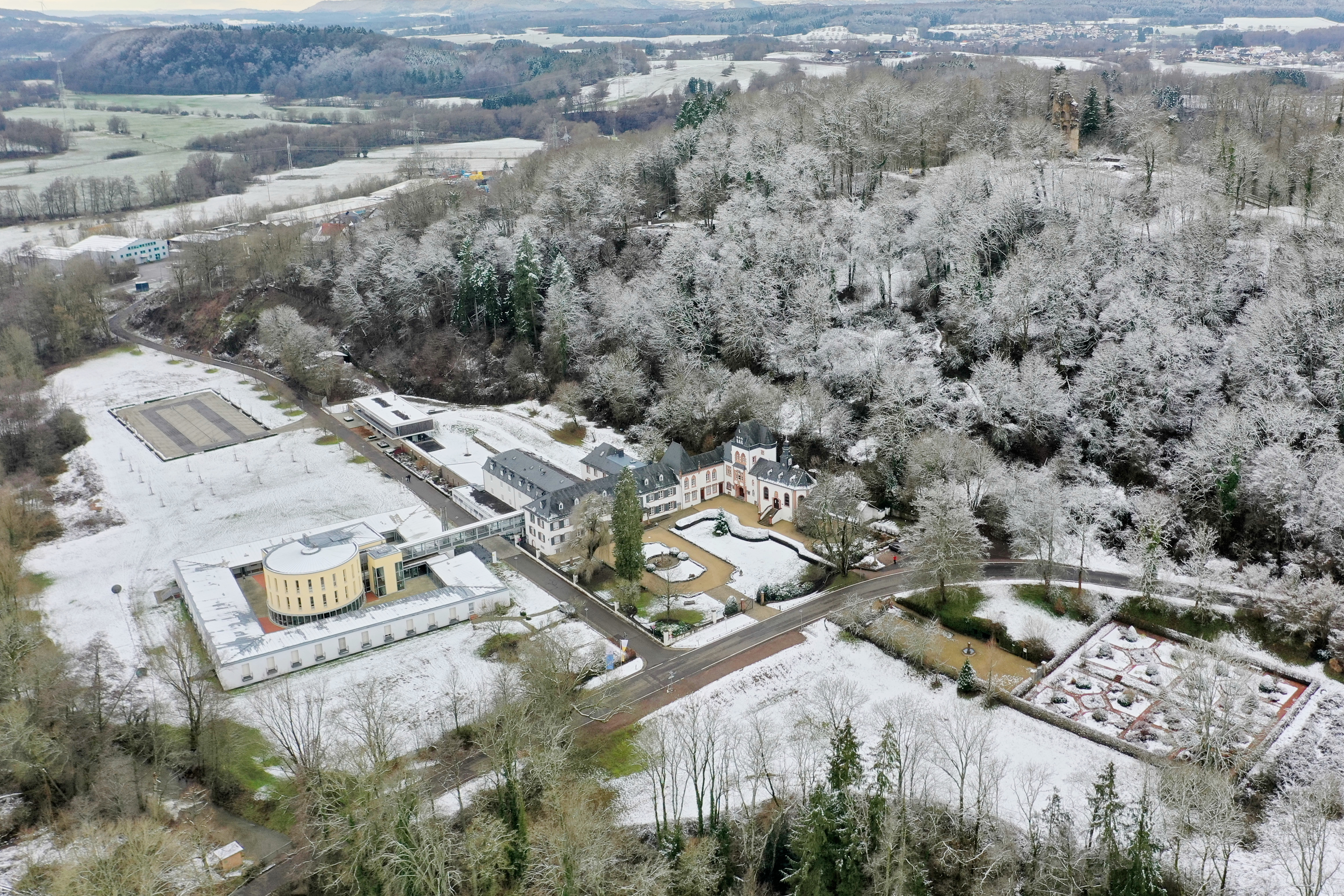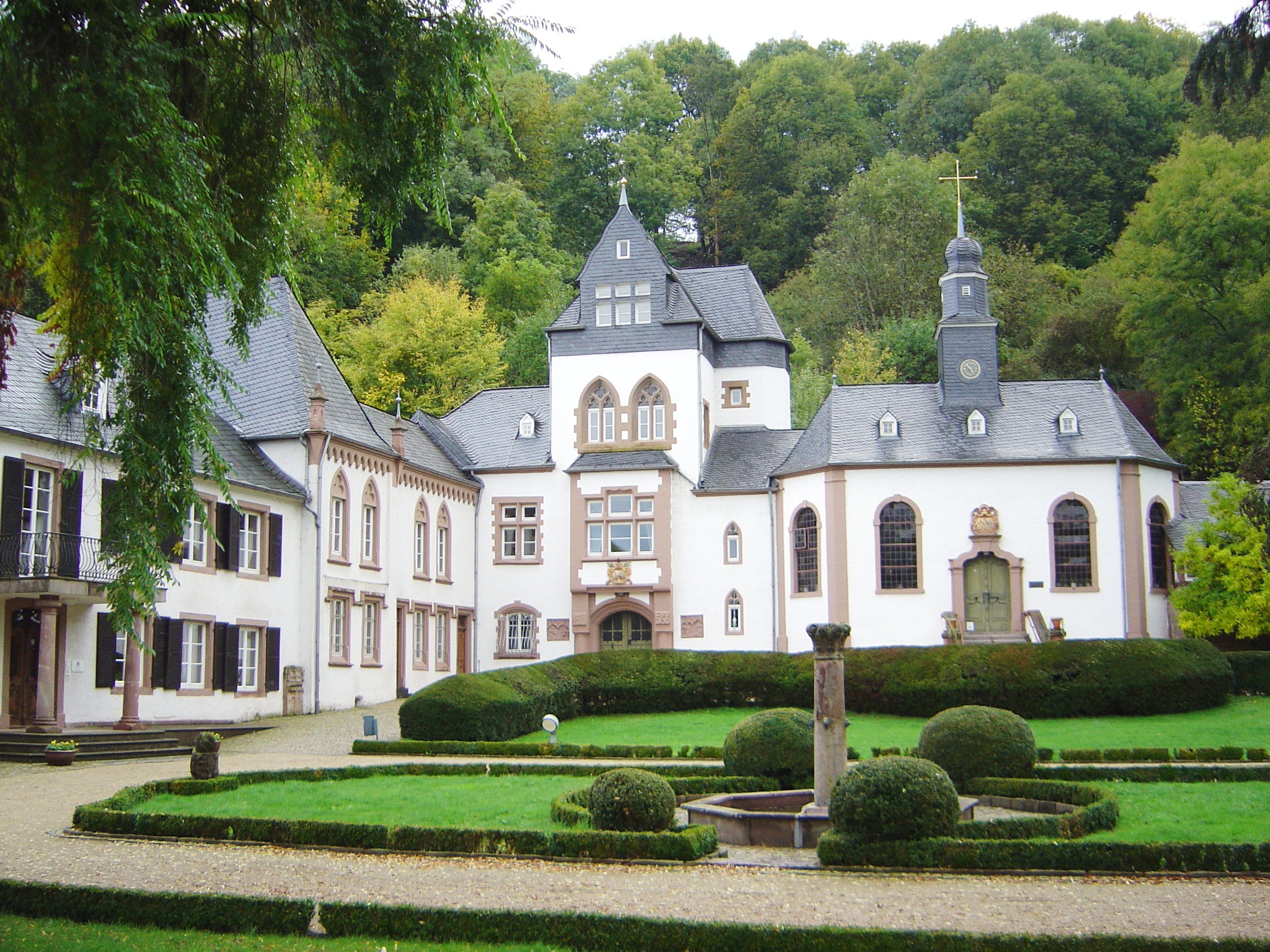Schloß Dagstuhl on:
[Wikipedia]
[Google]
[Amazon]



 Dagstuhl is a
Dagstuhl is a
Official website
Schloss Dagstuhl
on
Schloss Dagstuhl
on



 Dagstuhl is a
Dagstuhl is a computer science
Computer science is the study of computation, automation, and information. Computer science spans theoretical disciplines (such as algorithms, theory of computation, information theory, and automation) to practical disciplines (includin ...
research center in Germany
Germany, officially the Federal Republic of Germany (FRG),, is a country in Central Europe. It is the most populous member state of the European Union. Germany lies between the Baltic and North Sea to the north and the Alps to the sou ...
, located in and named after a district of the town of Wadern, Merzig-Wadern
Merzig-Wadern is a ''Kreis'' (district) in the northwest of the Saarland, Germany. Neighboring districts are Trier-Saarburg, Sankt Wendel, Saarlouis, the French ''département'' Moselle, and Luxembourg.
History
The district was created in 1816 w ...
, Saarland
The Saarland (, ; french: Sarre ) is a state of Germany in the south west of the country. With an area of and population of 990,509 in 2018, it is the smallest German state in area apart from the city-states of Berlin, Bremen, and Hamburg, and t ...
.
Location
Following the model of the mathematical center atOberwolfach
Oberwolfach ( gsw, label= Low Alemannic, Obberwolfä) is a town in the district of Ortenau in Baden-Württemberg, Germany. It is the site of the Oberwolfach Research Institute for Mathematics, or Mathematisches Forschungsinstitut Oberwolfach.
G ...
, the center is installed in a very remote and relaxed location in the countryside.
The Leibniz Center is located in a historic country house
An English country house is a large house or mansion in the English countryside. Such houses were often owned by individuals who also owned a Townhouse (Great Britain), town house. This allowed them to spend time in the country and in the cit ...
, Schloss Dagstuhl (Dagstuhl Castle), together with modern purpose-built buildings connected by an enclosed footbridge.
The ruins of the 13th-century Dagstuhl Castle are nearby, a short walk up a hill from the Schloss.
History
The Leibniz-Zentrum für Informatik (LZI, ''Leibniz Center for Informatics'') was established at Dagstuhl in 1990. In 1993, the over 200-year-old building received a modern extension with other guest rooms, conference rooms and a library. The center is managed as a non-profit organization, and financed by national funds. It receives scientific support by a variety of German and foreign research institutions. Until April 2008 the name of the center was: International Conference and Research Center for Computer Science (German
German(s) may refer to:
* Germany (of or related to)
**Germania (historical use)
* Germans, citizens of Germany, people of German ancestry, or native speakers of the German language
** For citizens of Germany, see also German nationality law
**Ger ...
: ''Internationales Begegnungs- und Forschungszentrum für Informatik (IBFI)''). The center was founded by Reinhard Wilhelm, who continued as its director until May 2014, when Raimund Seidel Raimund G. Seidel is a German and Austrian theoretical computer scientist and an expert in computational geometry.
Seidel was born in Graz, Austria, and studied with Hermann Maurer at the Graz University of Technology. He received his M. Sc. in ...
became the director. The list of shareholders includes:
* German Informatics Society
* Saarland University
Saarland University (german: Universität des Saarlandes, ) is a public research university located in Saarbrücken, the capital of the German state of Saarland. It was founded in 1948 in Homburg in co-operation with France and is organized in si ...
* Technical University of Kaiserslautern
Technical University of Kaiserslautern (German: ''Technische Universität Kaiserslautern'', also known as TU Kaiserslautern or TUK) is a public research university in Kaiserslautern, Germany.
There are numerous institutes around the university ...
* Karlsruhe Institute of Technology
The Karlsruhe Institute of Technology (KIT; german: Karlsruher Institut für Technologie) is a public research university in Karlsruhe, Germany. The institute is a national research center of the Helmholtz Association.
KIT was created in 2009 w ...
* Technische Universität Darmstadt
* University of Stuttgart
The University of Stuttgart (german: Universität Stuttgart) is a leading research university located in Stuttgart, Germany. It was founded in 1829 and is organized into 10 faculties. It is one of the oldest technical universities in Germany wi ...
* University of Trier
The University of Trier (german: Universität Trier), in the German city of Trier, was founded in 1473. Closed in 1798 by order of the then French administration in Trier, the university was re-established in 1970 after a hiatus of some 172 ...
* Goethe University in Frankfurt
Frankfurt, officially Frankfurt am Main (; Hessian: , " Frank ford on the Main"), is the most populous city in the German state of Hesse. Its 791,000 inhabitants as of 2022 make it the fifth-most populous city in Germany. Located on its ...
* Centrum Wiskunde & Informatica
The (abbr. CWI; English: "National Research Institute for Mathematics and Computer Science") is a research centre in the field of mathematics and theoretical computer science. It is part of the institutes organization of the Dutch Research C ...
, Netherlands
)
, anthem = ( en, "William of Nassau")
, image_map =
, map_caption =
, subdivision_type = Sovereign state
, subdivision_name = Kingdom of the Netherlands
, established_title = Before independence
, established_date = Spanish Netherl ...
* Institute for Research in Computer Science and Automation, France
France (), officially the French Republic ( ), is a country primarily located in Western Europe. It also comprises of overseas regions and territories in the Americas and the Atlantic, Pacific and Indian Oceans. Its metropolitan ar ...
* Max Planck Society
The Max Planck Society for the Advancement of Science (german: Max-Planck-Gesellschaft zur Förderung der Wissenschaften e. V.; abbreviated MPG) is a formally independent non-governmental and non-profit association of German research institutes. ...
In 2012, another new building was opened with 7 guest rooms. Since 1 January 2005, the LZI is a member of the Leibniz Association
The Leibniz Association (German: ''Leibniz-Gemeinschaft'' or ''Wissenschaftsgemeinschaft Gottfried Wilhelm Leibniz'') is a union of German non-university research institutes from various disciplines.
As of 2020, 96 non-university research insti ...
.
Library
Dagstuhl's computer science library has over 50,000 books and other media, among them a full set ofSpringer-Verlag
Springer Science+Business Media, commonly known as Springer, is a German multinational publishing company of books, e-books and peer-reviewed journals in science, humanities, technical and medical (STM) publishing.
Originally founded in 1842 ...
's Lecture Notes in Computer Science
''Lecture Notes in Computer Science'' is a series of computer science books published by Springer Science+Business Media since 1973.
Overview
The series contains proceedings, post- proceedings, monographs, and Festschrift
In academia, a ''F ...
(LNCS) series and electronic access to many computer science journals.
Seminar series
Dagstuhl supports computer science by organizing high ranked seminars on hot topics in informatics. Dagstuhl Seminars, which are established after review and approval by the Scientific Directorate, bring together personally invited scientists from academia and industry from all over the world to discuss their newest ideas and problems. Apart from the Dagstuhl seminars, the center also hosts summer schools, group retreats, and other scientific events, all discussing informatics. Every year about 3,500 scientists stay in Dagstuhl for about 100 seminars, workshops and other scientific events. The number of participants is limited to enable discussion and by the available housing capacity. The stay is full-board; participants are accommodated in the original house or in the modern annex, and have all their meals at the center. Seminars are usually held for a weekly period: participants arrive on Sunday evening and depart on Friday evening or Saturday morning. One or sometimes two seminars are held simultaneously with other small meetings. The cryptographic technique DP5 (Dagstuhl Privacy Preserving Presence Protocol P) is named after Schloss Dagstuhl.Publications
As well as publishing proceedings from its own seminars, the Leibniz Center publishes the Leibniz International Proceedings in Informatics (LIPIcs), a series ofopen access
Open access (OA) is a set of principles and a range of practices through which research outputs are distributed online, free of access charges or other barriers. With open access strictly defined (according to the 2001 definition), or libre o ...
conference proceedings
In academia and librarianship, conference proceedings is a collection of academic papers published in the context of an academic conference or workshop. Conference proceedings typically contain the contributions made by researchers at the conferen ...
from computer science conferences worldwide. Conferences published in this series include the Symposium on Theoretical Aspects of Computer Science (STACS), held annually in Germany and France, the conference on Foundations of Software Technology and Theoretical Computer Science (FSTTCS), held annually in south Asia, the Computational Complexity Conference (CCC), held at a different international venue each year, the Symposium on Computational Geometry (SoCG), the International Colloquium on Automata, Languages and Programming (ICALP), the International Symposium on Mathematical Foundations of Computer Science (MFCS) and the International Conference on Concurrency Theory (CONCUR).
See also
*Leibniz Association
The Leibniz Association (German: ''Leibniz-Gemeinschaft'' or ''Wissenschaftsgemeinschaft Gottfried Wilhelm Leibniz'') is a union of German non-university research institutes from various disciplines.
As of 2020, 96 non-university research insti ...
* FIZ Karlsruhe
*Heidelberg Institute for Theoretical Studies
The Heidelberg Institute for Theoretical Studies (HITS gGmbH) was established in 2010 by SAP co-founder Klaus Tschira through his foundation, the " Klaus Tschira Stiftung", as a private, non-profit research institute. HITS conducts basic resear ...
*DBLP
DBLP is a computer science bibliography website. Starting in 1993 at Universität Trier in Germany, it grew from a small collection of HTML files and became an organization hosting a database and logic programming bibliography site. Since No ...
References
External links
Official website
Schloss Dagstuhl
on
LinkedIn
LinkedIn () is an American business and employment-oriented online service that operates via websites and mobile apps. Launched on May 5, 2003, the platform is primarily used for professional networking and career development, and allows job s ...
Schloss Dagstuhl
on
Twitter
Twitter is an online social media and social networking service owned and operated by American company Twitter, Inc., on which users post and interact with 280-character-long messages known as "tweets". Registered users can post, like, and ...
{{Authority control
Non-profit_organisations_based_in_Germany
1990 establishments in Germany
Leibniz Association
Computer science institutes in Germany
International research institutes
Castles in Saarland
Buildings and structures in Merzig-Wadern